Native Son – February, 2009
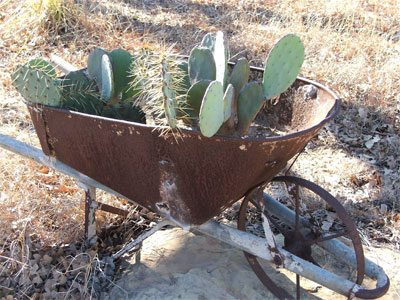
Yard art along Highway 4 reminds the writer that "tough times are relative." All photos by Steven Chamblee.
Closer to Home
Life isn’t about finding yourself … it’s about creating yourself.
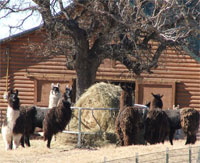
A Texas alpaca ranch.
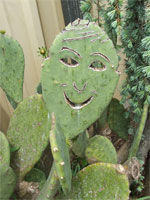
Prickly pear happy face art by Greg Grant, Stephen F. Austin State University.
I don’t know who said that, but I have espoused the spirit of the phrase, and I suppose that’s what my little road trips are about — creating memories and, ultimately, myself. Financial reality came a-knocking rather loudly this year, so my journey to Mountain States Wholesale Nursery (www.mswn.com) and the Grand Canyon (www.youreallyneedtoseeitin-person.duh) may have to wait. Maybe life is simply guiding me to seek adventure closer to home — so west on little ole Garner Road I went.
Not surprisingly, I ended up on some little back road dotted with old graveyards, alpaca ranches, mesquite trees, and prickly pear cactus. Now, for the uninitiated, this might seem like a desolate place. Ha! For those in the know, this is paradise. Old graveyards are a tangible place to honor the past and learn of our history. Alpacas may be kind of funny looking, but they produce the finest textile around, better even than cashmere, say the local weavers.
You may let me slide on graveyards and alpacas, but mesquite and prickly pear are still a pretty hard sell for most folks. (Before I get started, ponder for a moment that every day there’s one guy out there trying to clear a parcel of established mesquite trees, while a few miles down the road, there’s another fella trying to plant a forest that will survive all that Texas can dish out. You’d think they could get together, shoot the breeze over a couple of Shiners, and save themselves a whole lotta work….)
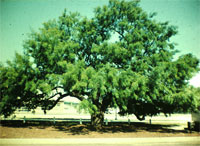
Mesquite
Mesquite trees come in a variety of varieties, but the most common around North Texas is honey mesquite (Prosopis glandulosa). Yep, it’s got big ol’ thorns (…well, technically, they’re spines). It also grows in rich or poor soils, has the ability to survive drought, heat, and cold, and rarely has any disease issues, save for mistletoe. The wood is closely grained, hard, and warp-resistant; prized for fine furniture, gun stocks, knife handles, and many other high-value items. The wood from the base of the trunk is especially well figured, with curls and swirls in the grain, making it the favorite for an endless array of artistic endeavors. (Try NOT finding mesquite in any Texas woodworker’s menagerie.) Bees produce exquisite honey from mesquite nectar (one-twelfth of a teaspoon per bee in her lifetime!), and mesquite is one of the few trees to cast "perfect shade," allowing the gardener to cultivate sun and/or shade plants underneath the canopy. And if that still doesn’t float your boat, then you can cut it down and burn it … just make sure you’ve got a nice rack of ribs, some chicken thighs, and a few sausages above those flames, because it’s the best barbeque wood around … just ask Angelo.
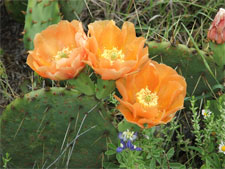
The State Plant of Texas
Prickly pear (Opuntia sp.) has its merits as well. And yep, most have big ol’ thorns. (Well, technically, they’re spines too. FYI, a thorn is a modified stem; a spine is a modified leaf.) But prickly pear has another special surprise — tiny barbed hairs called glochids that are very irritating and near impossible to remove. Again, a variety of varieties (some vicious; some spineless), tough as nails, and a wide range of habitats (from southern Canada to the very tip of South America). The large, gorgeous, bright yellow or orange flowers are thought to have been the original "Yellow Rose of Texas." The ensuing red or purple fruit, often called tunas, is the source of flavor for jellies, jams, and candies. The young, pre-spined pads (technically, they’re stems called cladophylls) can be sliced and cooked — you can easily find jars of these nopalitos in almost any Texas grocery store. (Nopalitos have a texture similar to okra.) The pads also serve as host for an insect called cochineal, from which rich purple dyes are made. And even after all of that, few Texans know that the 74th legislature voted the prickly pear the official State Plant of Texas.
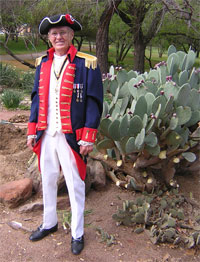
Dr. Ed Maddox, octogenarian, close friend, and the author of Ten Thousand Miles Hunting Texas Cactus, dressed on this occasion for a Sons of the American Revolution event.
Both the mesquite and prickly pear have been used for livestock food in tough times — the former’s seed pods and the latter’s pads after the spines have been burned off. Desperate times call for desperate measures, I suppose, and according to the TV news, we’re in for some hard times right now. Well, I’ve talked with enough octogenarians to know that times aren’t all that bad, and a little adversity builds character … makes you appreciate what you do have. It allows me to look at a gnarly old cactus and accept it for what it is, not what it isn’t. It allows me to see the beauty, not just the beast. It allows me to enjoy each day, whether it’s rough or smooth, and appreciate this country, this time, this gift of life just as it comes … just like old graveyards, alpacas, mesquites, people … and ultimately, I suppose, myself.
Every step of the journey is the journey.
-Zen saying
About the author: Steven Chamblee is the chief horticulturist for Chandor Gardens in Weatherford and a regular contributor to Neil Sperry’s GARDENS magazine and e-gardens newsletter. He adds these footnotes:
A little help from my friends….
I still need some destinations for my Texas road trips! If you would like me to speak to your garden club or group, just shoot me an e-mail at schamblee@weatherfordtx.gov to make arrangements. I’m inexpensive and low maintenance, and you know I love to go just about anywhere, so let me know. No city too big; no town too small. As long as it has a Farm to Market road nearby, I’m in.
Before you know it, spring will be here!
Plan your visit to historic Chandor Gardens now. We have made lots of changes this past year, so if you haven’t seen Chandor Gardens lately, you just haven’t seen Chandor Gardens! We’ve got 300 azaleas, fountains, sculpture, grottoes, a labyrinth, and more. You can go to the website (www.chandorgardens.com) for a preview and call 817-613-1700 for reservations and more information.

